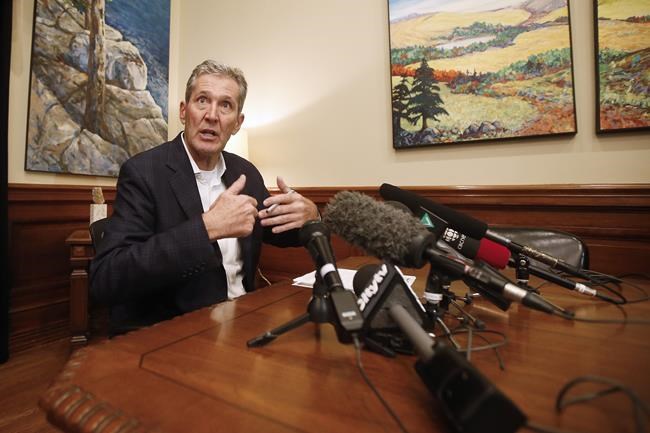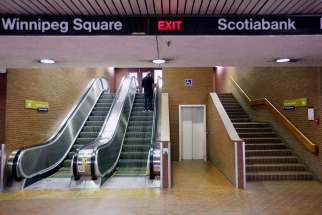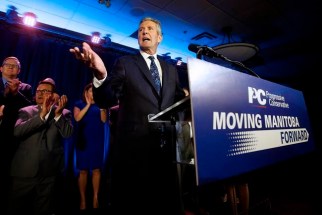Tories benefit from taxpayer subsidy they denounced
Read this article for free:
or
Already have an account? Log in here »
To continue reading, please subscribe:
Monthly Digital Subscription
$0 for the first 4 weeks*
- Enjoy unlimited reading on winnipegfreepress.com
- Read the E-Edition, our digital replica newspaper
- Access News Break, our award-winning app
- Play interactive puzzles
*No charge for 4 weeks then price increases to the regular rate of $19.00 plus GST every four weeks. Offer available to new and qualified returning subscribers only. Cancel any time.
Monthly Digital Subscription
$4.75/week*
- Enjoy unlimited reading on winnipegfreepress.com
- Read the E-Edition, our digital replica newspaper
- Access News Break, our award-winning app
- Play interactive puzzles
*Billed as $19 plus GST every four weeks. Cancel any time.
To continue reading, please subscribe:
Add Free Press access to your Brandon Sun subscription for only an additional
$1 for the first 4 weeks*
*Your next subscription payment will increase by $1.00 and you will be charged $16.99 plus GST for four weeks. After four weeks, your payment will increase to $23.99 plus GST every four weeks.
Read unlimited articles for free today:
or
Already have an account? Log in here »
Hey there, time traveller!
This article was published 24/06/2020 (1993 days ago), so information in it may no longer be current.
How’s this for irony?
One year after Premier Brian Pallister threatened to eliminate a taxpayer subsidy paid to political parties to cover election expenses, his party is facing a cash crunch and will have to lean heavily on that rebate to bring his party back into the black.
In its 2019 annual return filed with Elections Manitoba, the Progressive Conservative Party ended the year with a small deficit ($73,000) and no cash assets. That is the first time since the Tories came to power in 2016 that the party has started a year in the red and with no cash on hand, a remarkable turnaround for a party that has dominated political fundraising in recent years.
Pallister will now have to rely heavily on the election expense rebate to get his party back into the black. The exact amount of the rebate has not yet been reported by Elections Manitoba, but according to party officials, the Tories can expect to receive about $300,000, an amount that would erase their deficit.
The windfall could have been more but one year ago, Pallister tried to eliminate the rebate, which at the time refunded 50 per cent of eligible expenses to all parties and candidates that received at least 10 per cent of the popular vote.
“That’s a subsidy directly to political organizations that does nothing for Manitobans,” Pallister said at the time.

Ultimately, the Tories reached a compromise with the NDP to cut the rebate in half (25 per cent of eligible expenses) for parties or candidates that get at least five per cent of the vote. Pallister said his party would still collect the reduced rebate.
It’s quite likely that many Tories are relieved that Pallister stepped back from his original plan given the financial situation the PC Party faces.
PC Treasurer Gestur Kristjansson said the financial situation facing the party is manageable but still “cause for concern.” On a go-forward basis, the party will have to invoke some measure of “austerity” to address its shortfall, he added.
A key factor in the erosion of the Tories financial footing was a surge in spending on party operations.
In non-election years since taking power, the PC Party booked average expenses of roughly $1.9 million. In 2019, the party budget soared to $2.6 million, including nearly $700,000 for salaries. That is a 36-per-cent increase over the average and contributed to a $913,000 deficit in party operations.
Included in those austerity measures is a decision to delay hiring of a new CEO, Kristjannson said. Former CEO Keith Stewart took a position as director of the PC caucus in the legislature and it is unclear when he will be replaced.
Kristjannson said the year-end financial situation was exacerbated by the September election, which did not leave much time in the calendar year for post-vote fundraising. Most parties, he said, go into some amount of debt to wage an election campaign, and then fundraise afterwards to pay off debts.
On that point, Kristjannson is correct; both the Liberals ($14,896) and the NDP ($130,642) reported deficits for 2019. The major differences are that both opposition parties anticipated deficits because they raise considerably less money than the governing PCs, and they did not try to eliminate the election expense rebate.
Kristjannson said that in a normal year, the party would just focus its efforts on fundraising and erase any deficit from the year before. However, this year, COVID-19 has severely restricted economic activity and, in the process, discouraged many people from donating to political parties, he said.

March in non-election years is generally considered one of the best months for political fundraising both at the provincial and federal levels. Elections Manitoba only reports political fundraising annually, but at the federal level, reporting is done on a quarterly basis.
Based on the most recent data, this past March saw the lowest fundraising totals for federal parties since March 2006, immediately following the third election in six years.
Is the same situation unfolding at the provincial level? If a verbose, four-page fundraising letter Pallister sent out in May is any indication, Manitoba’s political parties are facing similarly hard times.
The fundraising letter comes at a critical moment in Pallister’s leadership. Following well-publicized shortcomings in his economic response to the pandemic, support for the Pallister government is in free fall. Province-wide, a Free Press-Probe Research poll showed the Tories in a virtual tie with the NDP; in Winnipeg, they trail the NDP by nearly 20 points.
If a verbose, four-page fundraising letter Pallister sent out in May is any indication, Manitoba’s political parties are facing hard times.
Despite declining support, Pallister crowed in the letter about how successful the Tory government has been in responding to the pandemic. Then, he asked party members to do three things.
First, Pallister asked them to help him “lead our economic recovery” by sending along any ideas or opinions about Manitoba’s pandemic recovery plan. Second, he urged party members to volunteer or support a local charity.
Finally, he strongly recommended they donate as “we are now falling short on our fundraising goals and need our donors to come through for us so we can continue operations.”
It is unlikely the PC Party will cease operations, although the collision of the pandemic and declining support for the party and its leader will do nothing to improve Tory fundraising efforts.
Neither will the image of a premier using a taxpayer rebate he tried to eliminate as a lifeline to keep his political dreams alive.
dan.lett@freepress.mb.ca

Born and raised in and around Toronto, Dan Lett came to Winnipeg in 1986, less than a year out of journalism school with a lifelong dream to be a newspaper reporter.
Our newsroom depends on a growing audience of readers to power our journalism. If you are not a paid reader, please consider becoming a subscriber.
Our newsroom depends on its audience of readers to power our journalism. Thank you for your support.








